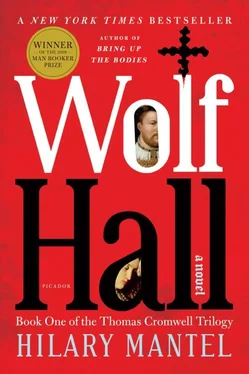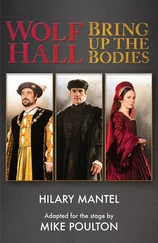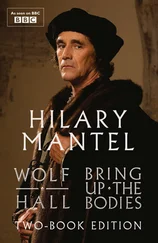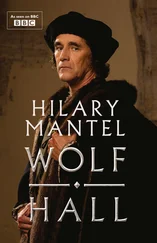Wolf Hall
by Hilary Mantel
To my singular friend
Mary Robertson this be given.
In Putney, 1500
Walter Cromwell, a blacksmith and brewer.
Thomas, his son.
Bet, his daughter.
Kat, his daughter.
Morgan Williams, Kat's husband.
At Austin Friars, from 1527
Thomas Cromwell, a lawyer.
Liz Wykys, his wife.
Gregory, their son.
Anne, their daughter.
Grace, their daughter.
Henry Wykys, Liz's father, a wool trader.
Mercy, his wife.
Johane Williamson, Liz's sister.
John Williamson, her husband.
Johane (Jo), their daughter.
Alice Wellyfed, Cromwell's niece, daughter of Bet Cromwell.
Richard Williams, later called Cromwell, son of Kat and Morgan.
Rafe Sadler, Cromwell's chief clerk, brought up at Austin Friars.
Thomas Avery, the household accountant.
Helen Barre, a poor woman taken in by the household.
Thurston, the cook.
Christophe, a servant.
Dick Purser, keeper of the guard dogs.
At Westminster
Thomas Wolsey, Archbishop of York, cardinal, papal legate, Lord Chancellor: Thomas Cromwell's patron.
George Cavendish, Wolsey's gentleman usher and later biographer.
Stephen Gardiner, Master of Trinity Hall, the cardinal's secretary, later Master Secretary to Henry VIII: Cromwell's most devoted enemy.
Thomas Wriothesley, Clerk of the Signet, diplomat, protégé of both Cromwell and Gardiner.
Richard Riche, lawyer, later Solicitor General.
Thomas Audley, lawyer, Speaker of the House of Commons, Lord Chancellor after Thomas More's resignation.
At Chelsea
Thomas More, lawyer and scholar, Lord Chancellor after Wolsey's fall.
Alice, his wife.
Sir John More, his aged father.
Margaret Roper, his eldest daughter, married to Will Roper.
Anne Cresacre, his daughter-in-law.
Henry Pattinson, a servant.
In the city
Humphrey Monmouth, merchant, imprisoned for sheltering William Tyndale, translator of the Bible into English.
John Petyt, merchant, imprisoned on suspicion of heresy.
Lucy, his wife.
John Parnell, merchant, embroiled in long-running legal dispute with Thomas More.
Little Bilney, scholar burned for heresy.
John Frith, scholar burned for heresy.
Antonio Bonvisi, merchant, from Lucca.
Stephen Vaughan, merchant at Antwerp, friend of Cromwell.
At court
Henry VIII.
Katherine of Aragon, his first wife, later known as Dowager Princess of Wales.
Mary, their daughter.
Anne Boleyn, his second wife.
Mary, her sister, widow of William Carey and Henry's ex-mistress.
Thomas Boleyn, her father, later Earl of Wiltshire and Lord Privy Seal: likes to be known as ‘Monseigneur’.
George, her brother, later Lord Rochford.
Jane Rochford, George's wife.
Thomas Howard, Duke of Norfolk, Anne's uncle.
Mary Howard, his daughter.
Mary Shelton —
Jane Seymour — ladies-in-waiting.
Charles Brandon, Duke of Suffolk, old friend of Henry, married to his sister Mary.
Henry Norris —
Francis Bryan —
Francis Weston —
William Brereton —
Nicholas Carew — gentlemen attending the king.
Mark Smeaton, a musician.
Henry Wyatt, a courtier.
Thomas Wyatt, his son.
Henry Fitzroy, Duke of Richmond, the king's illegitimate son.
Henry Percy, Earl of Northumberland.
The clergy
William Warham, aged Archbishop of Canterbury.
Cardinal Campeggio, papal envoy.
John Fisher, Bishop of Rochester, legal adviser to Katherine of Aragon.
Thomas Cranmer, Cambridge scholar, reforming Archbishop of Canterbury, succeeding Warham.
Hugh Latimer, reforming priest, later Bishop of Worcester.
Rowland Lee, friend of Cromwell, later Bishop of Coventry and Lichfield.
In Calais
Lord Berners, the Governor, a scholar and translator.
Lord Lisle, the incoming Governor.
Honor, his wife.
William Stafford, attached to the garrison.
At Hatfield
Lady Bryan, mother of Francis, in charge of the infant princess, Elizabeth.
Lady Anne Shelton, Anne Boleyn's aunt, in charge of the former princess, Mary.
The ambassadors
Eustache Chapuys, career diplomat from Savoy, London ambassador of Emperor Charles V.
Jean de Dinteville, an ambassador from Francis I.
The Yorkist claimants to the throne
Henry Courtenay, Marquis of Exeter, descended from a daughter of Edward IV.
Gertrude, his wife.
Margaret Pole, Countess of Salisbury, niece of Edward IV.
Lord Montague, her son.
Geoffrey Pole, her son.
Reginald Pole, her son.
The Seymour family at Wolf Hall
Old Sir John, who has an affair with the wife of his eldest son Edward.
Edward Seymour, his son.
Thomas Seymour, his son.
Jane, his daughter: at court.
Lizzie, his daughter, married to the Governor of Jersey.
William Butts, a physician.
Nikolaus Kratzer, an astronomer.
Hans Holbein, an artist.
Sexton, Wolsey's fool.
Elizabeth Barton, a prophetess.
The Tudors
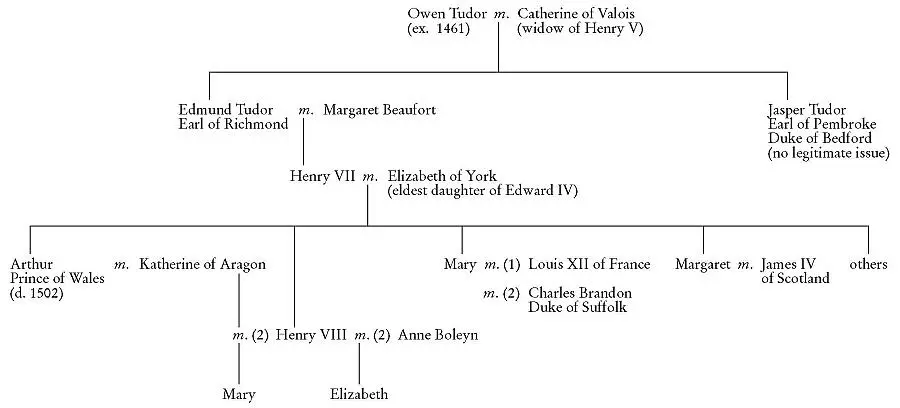
The Yorkist Claimants
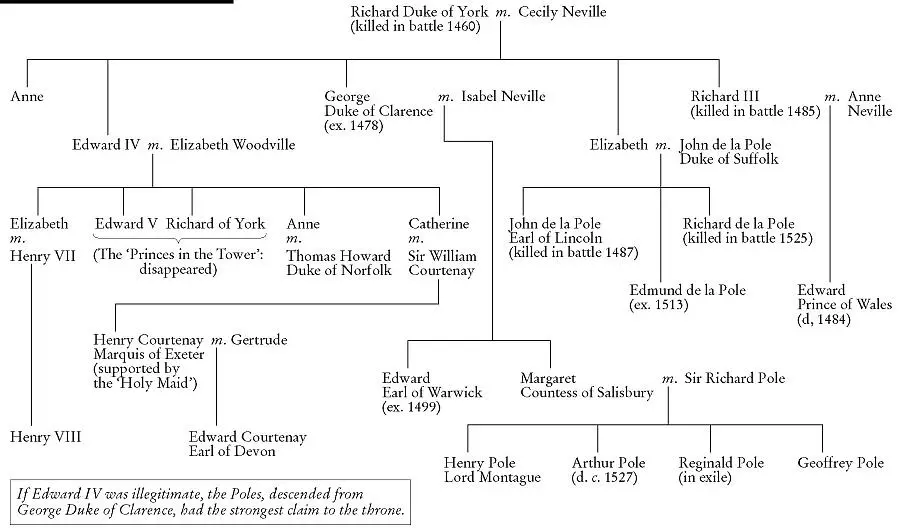
‘There are three kinds of scenes, one called the tragic, second the comic, third the satyric. Their decorations are different and unalike each other in scheme. Tragic scenes are delineated with columns, pediments, statues and other objects suited to kings; comic scenes exhibit private dwellings, with balconies and views representing rows of windows, after the manner of ordinary dwellings; satyric scenes are decorated with trees, caverns, mountains and other rustic objects delineated in landscape style.’
VITRUVIUS, De Architectura , on the theatre, c .27BC
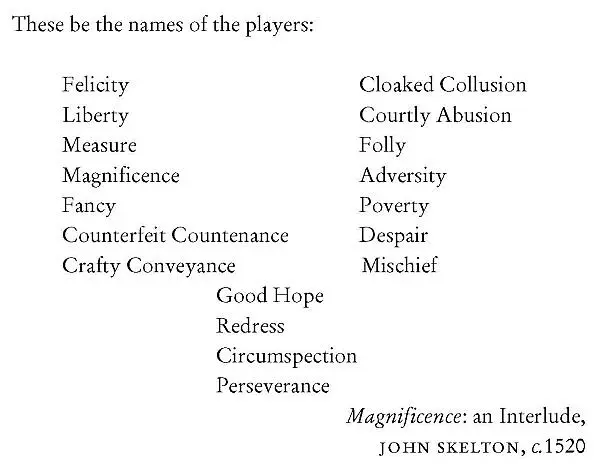
Chapter I.
Across the Narrow Sea.
Putney, 1500
‘So now get up.’
Felled, dazed, silent, he has fallen; knocked full length on the cobbles of the yard. His head turns sideways; his eyes are turned towards the gate, as if someone might arrive to help him out. One blow, properly placed, could kill him now.
Blood from the gash on his head – which was his father's first effort – is trickling across his face. Add to this, his left eye is blinded; but if he squints sideways, with his right eye he can see that the stitching of his father's boot is unravelling. The twine has sprung clear of the leather, and a hard knot in it has caught his eyebrow and opened another cut.
‘So now get up!’ Walter is roaring down at him, working out where to kick him next. He lifts his head an inch or two, and moves forward, on his belly, trying to do it without exposing his hands, on which Walter enjoys stamping. ‘What are you, an eel?’ his parent asks. He trots backwards, gathers pace, and aims another kick.
It knocks the last breath out of him; he thinks it may be his last. His forehead returns to the ground; he lies waiting, for Walter to jump on him. The dog, Bella, is barking, shut away in an outhouse. I'll miss my dog, he thinks. The yard smells of beer and blood. Someone is shouting, down on the riverbank. Nothing hurts, or perhaps it's that everything hurts, because there is no separate pain that he can pick out. But the cold strikes him, just in one place: just through his cheekbone as it rests on the cobbles.
Читать дальше
Конец ознакомительного отрывка
Купить книгу
